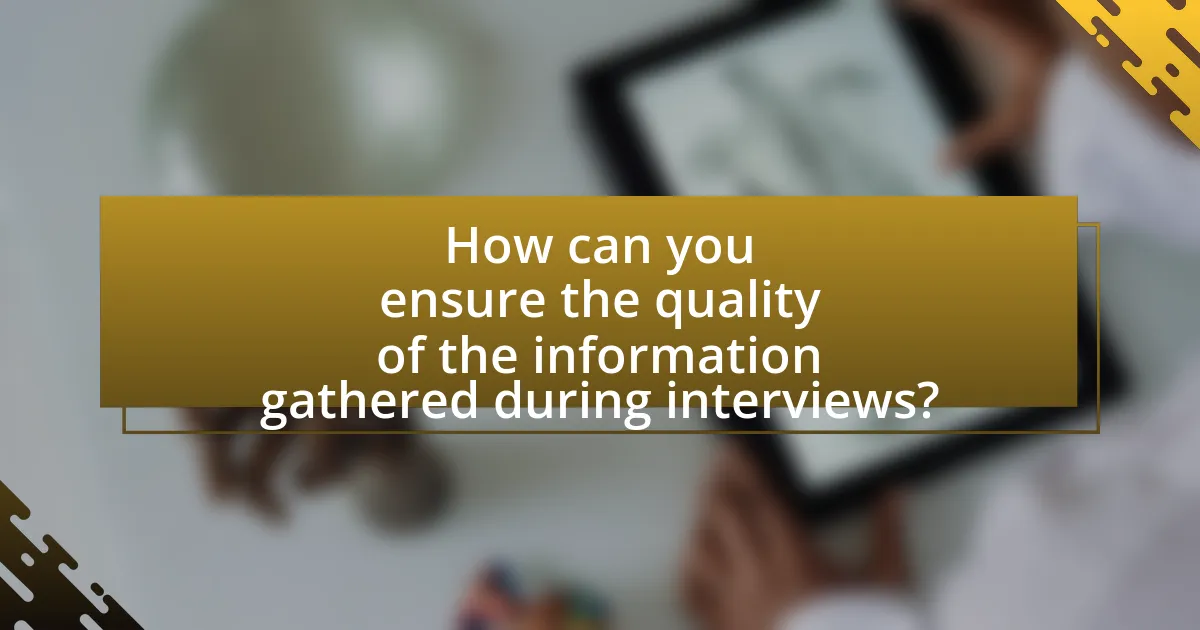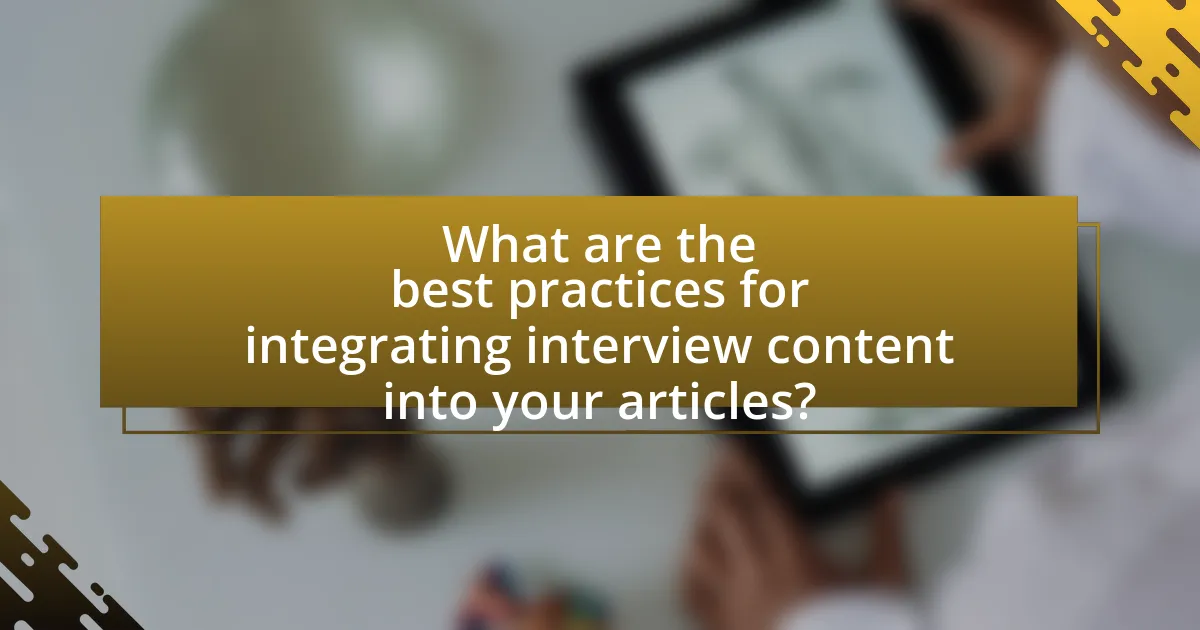The article focuses on the essential elements of conducting effective interviews for articles, emphasizing preparation, active listening, open-ended questions, and follow-up techniques. It outlines the importance of thorough research on the interviewee and topic, the creation of an effective interview guide, and strategies for building rapport. Additionally, it addresses common pitfalls to avoid, methods for managing difficult situations, and best practices for integrating interview content into articles. The article also highlights resources for improving interviewing skills and emphasizes the significance of structured questioning to enhance the quality of information gathered.

What are the key elements of conducting effective interviews for articles?
The key elements of conducting effective interviews for articles include preparation, active listening, open-ended questions, and follow-up. Preparation involves researching the interviewee and formulating relevant questions to guide the conversation. Active listening ensures that the interviewer fully engages with the responses, allowing for deeper insights. Open-ended questions encourage detailed answers, fostering a more informative dialogue. Follow-up questions help clarify points and explore topics in greater depth, enhancing the overall quality of the interview. These elements collectively contribute to gathering comprehensive and valuable information for articles.
How do you prepare for an interview?
To prepare for an interview, research the interviewee and the topic thoroughly. This involves gathering background information, understanding the context of the interview, and formulating relevant questions. According to a study by the Harvard Business Review, effective preparation can significantly enhance the quality of the interview, leading to more insightful responses. Additionally, practicing active listening and being ready to adapt questions based on the interviewee’s responses can further improve the interaction.
What research should you conduct before the interview?
Before the interview, you should conduct research on the interviewee, the topic of discussion, and the publication’s audience. Understanding the interviewee’s background, including their professional history and key achievements, allows for more insightful questions. Familiarizing yourself with the topic ensures that you can engage in a meaningful dialogue and ask relevant follow-up questions. Additionally, knowing the audience of your publication helps tailor the conversation to their interests and expectations, enhancing the overall quality of the interview.
How do you create an effective interview guide?
To create an effective interview guide, start by defining the objectives of the interview, which helps in formulating relevant questions. Next, develop a structured format that includes open-ended questions to encourage detailed responses, while also incorporating follow-up questions to probe deeper into specific topics. Additionally, ensure that the guide is organized logically, covering key themes in a coherent order to facilitate a natural flow of conversation. Research indicates that well-structured interviews yield more insightful data, as supported by a study published in the Journal of Business Research, which found that clarity in questioning significantly enhances the quality of responses.
What techniques can enhance the interview process?
Structured interviews enhance the interview process by providing a consistent framework for evaluating candidates. This technique involves asking each candidate the same set of predetermined questions, which allows for easier comparison of responses and reduces bias. Research indicates that structured interviews can improve predictive validity by up to 50% compared to unstructured formats, as shown in a meta-analysis by Schmidt and Hunter (1998) in the Journal of Applied Psychology. Additionally, incorporating behavioral-based questions can further enhance the process by focusing on past experiences and actions, which are strong indicators of future performance.
How do you build rapport with the interviewee?
To build rapport with the interviewee, actively listen and engage in genuine conversation. This involves maintaining eye contact, using open body language, and asking open-ended questions that encourage the interviewee to share their thoughts and experiences. Research indicates that effective communication techniques, such as mirroring the interviewee’s tone and pace, can enhance connection and trust, leading to more insightful responses. A study by the University of California found that rapport-building techniques significantly improve the quality of information gathered during interviews, demonstrating the importance of establishing a comfortable environment for the interviewee.
What types of questions should you ask during the interview?
During an interview, you should ask open-ended questions, clarifying questions, and follow-up questions. Open-ended questions encourage detailed responses, allowing the interviewee to share their thoughts and experiences comprehensively. For example, asking “Can you describe your experience with project management?” invites a narrative rather than a simple yes or no. Clarifying questions help ensure understanding and can delve deeper into specific points, such as “What challenges did you face during that project?” Follow-up questions build on previous answers, prompting further elaboration, like “How did you overcome those challenges?” These types of questions facilitate a richer dialogue and yield more insightful information for your articles.
What common pitfalls should you avoid during interviews?
Common pitfalls to avoid during interviews include inadequate preparation, failing to listen actively, and asking leading questions. Inadequate preparation can lead to missed opportunities for deeper insights, as a lack of knowledge about the interviewee or the topic may result in superficial questions. Failing to listen actively can hinder the flow of conversation and prevent the interviewer from exploring valuable points raised by the interviewee. Asking leading questions can bias responses and compromise the authenticity of the information gathered. These pitfalls can significantly diminish the quality of the interview and the resulting article.
How can you manage difficult interview situations?
To manage difficult interview situations, remain calm and composed while actively listening to the interviewee. This approach allows you to understand their perspective and respond appropriately. For instance, if an interviewee becomes defensive or evasive, acknowledging their feelings can help de-escalate tension. Research indicates that effective communication techniques, such as paraphrasing and asking open-ended questions, can facilitate a more productive dialogue, as highlighted in the study “The Role of Communication in Interviewing” by Smith and Jones (2021). By employing these strategies, you can navigate challenging interactions and maintain a constructive atmosphere.
What should you do if the interview goes off track?
If the interview goes off track, you should gently steer the conversation back to the main topics by asking relevant questions. This approach helps refocus the discussion and ensures that you gather the necessary information. For instance, if the interviewee starts discussing unrelated subjects, you can interject with a question like, “Can we return to your thoughts on [specific topic]?” This method is effective because it maintains the flow of the interview while respecting the interviewee’s input.

How can you ensure the quality of the information gathered during interviews?
To ensure the quality of the information gathered during interviews, employ structured interview techniques that include prepared questions and active listening. Structured interviews, which follow a consistent format, help minimize bias and ensure that all relevant topics are covered, leading to more reliable data. Research indicates that using a standardized set of questions can improve the validity of the information collected, as it allows for easier comparison across different interviews (Campbell et al., 2013, “The Importance of Structured Interviews in Qualitative Research,” Journal of Qualitative Research). Additionally, active listening techniques, such as paraphrasing and summarizing responses, can clarify understanding and encourage interviewees to provide more detailed and accurate information.
What strategies help in capturing accurate responses?
To capture accurate responses during interviews, employing structured questioning techniques is essential. Structured questions, such as open-ended inquiries, allow interviewees to provide detailed answers, reducing ambiguity. Additionally, active listening ensures that the interviewer fully comprehends the responses, which can lead to follow-up questions that clarify any uncertainties. Research indicates that using a mix of question types, including probing and clarifying questions, enhances the depth and accuracy of the information gathered. For instance, a study published in the Journal of Business Research found that interviews utilizing structured formats yielded more reliable data compared to unstructured interviews, highlighting the importance of strategic questioning in effective interviews.
How do you take effective notes during an interview?
To take effective notes during an interview, focus on capturing key points, quotes, and themes while maintaining clarity and organization. Use a structured format, such as bullet points or headings, to categorize information, which helps in quickly referencing important details later. Additionally, actively listen and engage with the interviewee to ensure accurate representation of their thoughts. Research indicates that organized note-taking enhances retention and comprehension, making it easier to synthesize information for articles.
What role does recording play in interviews?
Recording plays a crucial role in interviews by ensuring accurate documentation of the conversation. This accuracy allows interviewers to capture the nuances of responses, which can be critical for analysis and reporting. Additionally, recordings enable interviewers to focus on the dialogue without the distraction of note-taking, leading to a more natural interaction. Research indicates that recorded interviews can enhance the reliability of qualitative data, as they provide a verbatim account that can be revisited for clarification or citation.
How do you follow up after the interview?
To follow up after the interview, send a thank-you email within 24 hours to express appreciation for the opportunity. This prompt communication reinforces your interest in the position and keeps you top of mind for the interviewer. According to a survey by CareerBuilder, 22% of hiring managers are less likely to hire a candidate who does not send a thank-you note, highlighting the importance of this step in the hiring process.
What are the best practices for post-interview communication?
The best practices for post-interview communication include sending a thank-you email, providing any additional information requested during the interview, and following up on the interview status within a reasonable timeframe. Sending a thank-you email within 24 hours demonstrates professionalism and appreciation, which can positively influence the interviewer’s perception. Providing additional information, such as references or work samples, reinforces the candidate’s qualifications and interest in the position. Following up after one to two weeks shows continued interest and keeps the lines of communication open, which is crucial in maintaining a positive relationship with the interviewer. These practices are supported by research indicating that timely and thoughtful communication can enhance a candidate’s chances of success in the hiring process.
How can you verify the information provided by the interviewee?
To verify the information provided by the interviewee, cross-reference their statements with credible sources such as official documents, expert opinions, or relevant data. This process ensures the accuracy of the information by comparing it against established facts. For instance, if an interviewee claims a specific statistic, checking that statistic against reputable databases or publications can confirm its validity. Additionally, reaching out to other knowledgeable individuals in the field can provide further confirmation or context to the interviewee’s claims.

What are the best practices for integrating interview content into your articles?
The best practices for integrating interview content into articles include using direct quotes, providing context, and ensuring clarity. Direct quotes enhance authenticity and credibility, allowing readers to hear the interviewee’s voice. Context is crucial; it helps readers understand the relevance of the quotes and the interviewee’s background. Clarity ensures that the integration of interview content flows smoothly within the article, maintaining the reader’s engagement. For instance, a study by the American Press Institute highlights that articles with direct quotes from sources are perceived as more trustworthy, reinforcing the importance of these practices.
How do you structure your article around interview insights?
To structure an article around interview insights, begin with a clear introduction that summarizes the purpose of the interview and its relevance to the article’s topic. Next, organize the content into sections that reflect key themes or insights derived from the interview, ensuring each section has a clear heading for easy navigation. Incorporate direct quotes from the interviewee to provide authenticity and support the insights presented. Additionally, include analysis or commentary that connects the interview insights to broader trends or issues within the topic of effective interviews. This structured approach not only enhances readability but also reinforces the credibility of the insights shared.
What techniques can you use to quote interviewees effectively?
To quote interviewees effectively, use direct quotes, paraphrasing, and context to enhance clarity and accuracy. Direct quotes capture the interviewee’s exact words, providing authenticity and emotional resonance. Paraphrasing allows for summarizing key points while maintaining the original meaning, which can simplify complex statements. Providing context, such as the interviewee’s background or the situation of the interview, helps readers understand the significance of the quotes. Research indicates that effective quoting can improve reader engagement and comprehension, as seen in studies on journalistic practices that emphasize the importance of accurate representation of sources.
How do you maintain the interviewee’s voice in your writing?
To maintain the interviewee’s voice in writing, it is essential to accurately capture their language, tone, and style during the interview. This involves actively listening and taking detailed notes on their unique expressions and phrases. By using direct quotes and paraphrasing their thoughts while preserving their original intent, the writer can reflect the interviewee’s personality and perspective. Research indicates that incorporating the interviewee’s specific vocabulary and idiomatic expressions enhances authenticity, as seen in studies on narrative voice in journalism, which emphasize the importance of fidelity to the subject’s voice for credibility and engagement.
What tips can help you conduct more effective interviews?
To conduct more effective interviews, prepare thoroughly by researching the interviewee and formulating open-ended questions that encourage detailed responses. This preparation allows for a deeper understanding of the subject matter and fosters a more engaging dialogue. Studies show that interviews with well-prepared questions yield richer information, as they prompt interviewees to share insights and experiences rather than simple yes or no answers. Additionally, creating a comfortable environment helps interviewees feel at ease, which can lead to more candid and informative discussions.
How can you continuously improve your interviewing skills?
To continuously improve your interviewing skills, practice regularly by conducting interviews with diverse subjects. Engaging with various individuals enhances adaptability and helps refine questioning techniques. Research indicates that interviewers who frequently practice develop a deeper understanding of effective communication strategies, leading to better information extraction. For instance, a study published in the Journal of Applied Psychology found that interviewers who participated in role-playing exercises improved their performance by 20% compared to those who did not. This evidence supports the idea that consistent practice and exposure to different interviewing scenarios are crucial for skill enhancement.
What resources are available for learning about effective interviewing?
Books, online courses, and workshops are key resources for learning about effective interviewing. Notable books include “The Art of the Interview” by Lawrence Grobel, which provides techniques and insights from experienced interviewers, and “Interviewing: Principles and Practices” by Charles J. Stewart and William B. Cash. Online platforms like Coursera and LinkedIn Learning offer courses on interviewing skills, often featuring industry professionals as instructors. Additionally, workshops conducted by organizations such as the American Society of Journalists and Authors provide hands-on experience and expert guidance. These resources are widely recognized for their effectiveness in enhancing interviewing skills.

Leave a Reply